Oculus Rift CV1 consumer comes in Q1 2016Noticia:
Company sets the date
Facebook Oculus has finally set the date for its Oculus Rift Consumer Version 1. It will be shipping to retail/e-tail in Q1 2016.
This is an official update to a question that has been asked for quite a while.
We have tried every single prototype of the Oculus Rift virtual reality (VR) headset and the last one, codenamed Crescent Bay, looked promising but still not ready for retail. It looks like that HTC and Valve, and their hyped product, kind of put a deadline on the Oculus plans.
We still have to try the Re Vive, and while we hope to see it very soon, we also heard that the technology works really well. Sony has Project Morpheus coming and Microsoft has its HoloLens concept, but without a precise launch date. A lot of companies want to attack this market segment and Oculus Rift is the first one to have an official launch date set for Q1 2016.
The picture above is an actual render of how the retail product should look like and we have no idea when we will have a chance to test them. We wonder what the dial switch actually does and it probably has something to do with the focus, but this is just our best guess. In order to run Oculus Rift, you will need still need a high-end graphics card in order to fully enjoy it, so Titan class, Fiji and Pascal sounds like a good GPU for this product.
The company hints that it plans to share more details in the coming weeks and probably has couple of demos ready for E3. The E3 will kick off on June 16th and we would be surprised if we didn't get a chance to see the consumer Oculus Rift there.
http://www.fudzilla.com/news/graphic...mes-in-q1-2016
User Tag List
 Likes: 0
Likes: 0
Resultados 61 a 75 de 208
Tópico: Oculus Rift
-
07-05-15, 07:49 #61Tech Ubër-Dominus


- Registo
- Nov 2013
- Local
- City 17
- Posts
- 30,121
- Likes (Dados)
- 0
- Likes (Recebidos)
- 2
- Avaliação
- 1 (100%)
- Mentioned
- 0 Post(s)
- Tagged
- 0 Thread(s)
-
07-05-15, 08:01 #62Tech Ubër-Dominus


- Registo
- Nov 2013
- Local
- City 17
- Posts
- 30,121
- Likes (Dados)
- 0
- Likes (Recebidos)
- 2
- Avaliação
- 1 (100%)
- Mentioned
- 0 Post(s)
- Tagged
- 0 Thread(s)
Oculus says don't shut the door of Oculus Rift on game consoles
Noticia:If you thought the Oculus Rift was only for PCs and not consoles, then you should think again. During TechCrunch Disrupt, Oculus VR officials noted there have been discussions to one day bring VR to the Sony PlayStation 4 and Microsoft Xbox One game consoles.
"We've talked to everyone," said Nate Mitchell, VP of Oculus VR, when asked if his company has spoken with Microsoft or Sony regarding the VR headset for game consoles. "There's a lot of people right now interested in the VR space. And we've said many times that we're interested in bringing the Rift to as many consoles or platforms as possible. Ultimately, we haven't announced any sorts of partnerships to date. But it's something we're always exploring."
Microsoft is developing HoloLens and Sony has its Project Morpheus, so it's unknown how receptive either company would be to Oculus VR. However, the Oculus Rift remains the best known VR headset, so it may not be a wise decision to shut it out completely in the future.
http://www.tweaktown.com/news/44983/...les/index.html
-
07-05-15, 09:12 #63Tech Ubër-Dominus


- Registo
- Nov 2013
- Local
- City 17
- Posts
- 30,121
- Likes (Dados)
- 0
- Likes (Recebidos)
- 2
- Avaliação
- 1 (100%)
- Mentioned
- 0 Post(s)
- Tagged
- 0 Thread(s)
Oculus Making Its Own Games For The Rift, Possible Gamepad Coming
Noticia: Oculus' Nate Mitchell
Oculus' Nate Mitchell
In addition to the exciting news that the Oculus Rift will be available Q1 2016, Oculus' Nate Mitchell took the stage at TechCrunch's Disrupt to drop some more juicy news nuggets about the company, its VR headset, and the various related experiences.
Homegrown Titles
First, he said that Oculus is making its own titles for the Rift. This only makes sense; in the same way that Microsoft, Sony and Nintendo publish their own titles, Oculus is creating some content for its own device.
This helps in multiple ways. First, as Mitchell noted, it takes some of the risk off of developers. They know that there is other content for their titles to hang out with, and Oculus can generate some momentum for adoption that will help third-party devs get their games out into the hands of consumers. Oculus can also set the tone, as it were, for what great content on the Rift can and should be.
Homegrown content is also a must because content in general is a must. When we saw the Oculus Rift Crescent Bay demo back at CES in January, the Rift seemed consumer-ready to us. We asked Brendan Iribe why it wasn't for sale yet, and his response boiled down to the fact that there's just not enough content.
 HeroBoundHe made the point that if you're low on content, users may be blown away by what they see at first, but they'll soon put the Rift down and walk away if there aren't more adventures to experience.
HeroBoundHe made the point that if you're low on content, users may be blown away by what they see at first, but they'll soon put the Rift down and walk away if there aren't more adventures to experience.
The first title in Oculus' arsenal is HeroBound, a third-person dungeon crawler-type game. The mobile version has been around for a while for the Gear VR, but Mitchell hinted that this will soon be a "full" title for the Oculus Rift.
Input Methods
Mitchell also talked about input for the Rift. While stating that Oculus will have more to say about input later this year, he noted that "No one has cracked the code in input yet."
He's right, but Oculus does seem to be behind in that regard. For example, you can't see your hands at all in the Rift, but you do get a facsimile of them in the Vive VR thanks to physical controllers. Leap Motion is also working on technology that will let you see your actual hands using a faceplate mounted onto a VR headset and what amounts to a high-speed infrared camera.
We presume that the final consumer version of the Rift will ship with controllers of some kind. Mitchell said that many VR experiences under development at present are geared towards gamepads, so it stands to reason that Oculus will be making its own.
Mitchell said that third-party peripherals are also coming, but they may take a while to hit the market. He said there needs to be standardized input and tech specs for those to work, which seemed to indicate that said input and specs are still being finalized.
In terms of input, there's a longer-range plan, too. Oculus' Research Division, headed by Michael Abrash, is looking at how input will develop and evolve over a 4-10 year span. The group is asking, "What will VR input look like down the road?" and also "What do we want it to look like?" Mitchell described Oculus' approach as a "diverse input strategy."
But What Will It Cost?
Although we now know approximately when the Rift will launch, we still don't know much of anything about the price. Mitchell dropped some hints, though. He said that Oculus wants the Rift to be "affordable," but of course it will still be a premium product -- in the "high-end range," he said.
Users will also need a gaming PC (the Oculus Rift is essentially a mega-peripheral), but it only needs to be able to run newer titles reasonably well. He said that users won't need an exceptionally high-end PC.
Finally, although the Rift will be available to buy directly from Oculus, Mitchell hinted that there will be a second retail experience, possibly in-store.
 The need for such a physical presence is patently obvious. We can only describe our closed-door VR experiences to you, our readers, so well. If a picture is worth a thousand words, a VR experience is worth a million. You simply have to experience these things for yourself.
The need for such a physical presence is patently obvious. We can only describe our closed-door VR experiences to you, our readers, so well. If a picture is worth a thousand words, a VR experience is worth a million. You simply have to experience these things for yourself.
We'll look forward to more news from Oculus throughout the year, particularly from E3 in June.
http://www.tomshardware.com/news/ocu...mes,29052.html
-
31-05-15, 20:28 #64Tech Ubër-Dominus


- Registo
- Nov 2013
- Local
- City 17
- Posts
- 30,121
- Likes (Dados)
- 0
- Likes (Recebidos)
- 2
- Avaliação
- 1 (100%)
- Mentioned
- 0 Post(s)
- Tagged
- 0 Thread(s)
Oculus Rift Price Bomb Dropped by CEO
Noticia: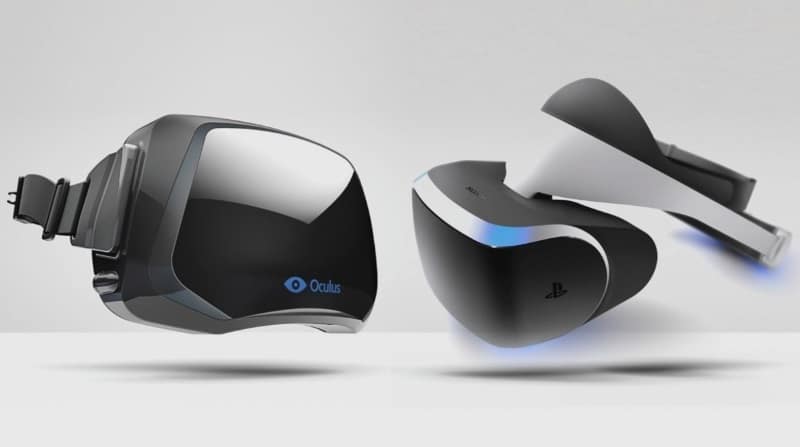
The most anticipated gaming hardware of possibly the decade has been flaunted in front of consumers since early development. What hasn’t been so widely shared is the price; which is seemly odd considering how close the release is.
Oculus CEO Brendan Iribe dropped the biggest hint, stating that a Rift headset and a computer powerful enough to drive it would cost in the region of $1,500 (£1,000). “We are looking at an ‘all-in’ price, if you have to go out and actually need to buy a new computer and you’re going to buy the Rift … at most you should be in that $1,500 range,” Iribe stated at the Re/code conference.
We know what the specifications are, so what about prices. If we use OverclockersUK for current prices and work out the remaining cost for the headset.
- NVIDIA GTX 970 / AMD 290 equivalent or greater
- Intel i5-4590 equivalent or greater
- 8GB+ RAM
- Compatible HDMI 1.3 video output
- 2x USB 3.0 ports
- Windows 7 SP1 or newer
A quick price tot up, using the cheapest non-stated products such as the motherboard, comes in at around $900 (£600). This leaves a pretty healthy $600 (£400) for the rift itself. This may come as a shock considering the most recent price estimate in September 2014 was between $200 to $400; does this new price include possible inflation or possibly the hiring out to an external company for product? I guess we will find out in a few months.
I can’t wait for the Oculus Rift now, I recently tried the newest Crescent Bay unit and I was very impressed. What are your thoughts on the pricing? Let us know in the comments.
Thank you to ArsTechnica for providing us with this information.
http://www.eteknix.com/oculus-rift-p...b-dropped-ceo/
-
31-05-15, 20:38 #65O Administrador


- Registo
- Mar 2013
- Local
- Multiverso
- Posts
- 17,815
- Likes (Dados)
- 74
- Likes (Recebidos)
- 156
- Avaliação
- 31 (100%)
- Mentioned
- 31 Post(s)
- Tagged
- 0 Thread(s)
Boas!
A guerra pelo 3D VR vai começar em muito breve e vamos ter vários a concorrer...
Oculus
Samsung
Sony
LG
Valve
Vai haver 2 API´s para VR um da Nvidia e outro da AMD, sendo que depois ainda existem outros... como o da Valve...
Vai ser interessante ver como é que isto se vai desenrolar...
Cumprimentos,
LPCMy Specs: .....

CPU: AMD Ryzen 7 5800X3D :-: Board: MSI B550M BAZOOKA :-: RAM: 64 GB DDR4 Kingston Fury Renegade 3600 Mhz CL16 :-: Storage: Kingston NV2 NVMe 2 TB + Kingston NV2 NVMe 1 TB
CPU Cooling Solution: ThermalRight Frost Commander 140 Black + ThermalRight TL-C12B-S 12CM PWM + ThermalRight TL-C14C-S 14CM PWM :-: PSU: Corsair HX 1200 WATTS
Case: NZXT H6 FLOW :-: Internal Cooling: 4x ThermalRight TL-C12B-S 12CM PWM + 4x ThermalRight TL-C14C-S 14CM PWM
GPU: ASUS TUF AMD RADEON RX 7900 XTX - 24 GB :-: Monitor: BenQ EW3270U 4K HDR
-
09-06-15, 21:07 #66Tech Ubër-Dominus


- Registo
- Nov 2013
- Local
- City 17
- Posts
- 30,121
- Likes (Dados)
- 0
- Likes (Recebidos)
- 2
- Avaliação
- 1 (100%)
- Mentioned
- 0 Post(s)
- Tagged
- 0 Thread(s)
Purported shots of the Oculus Rift CV1 see a controller teased
Noticia:Update: We are now looking at some very real-looking images on the NeoGAF forums, which show the Oculus Rift CV1 off in great detail. This includes the confirmation of the touch-based gamepad, and its SID tracker (Simple Input Device).
According to a post on the /r/oculus subreddit, we're seeing some rendered images of the Oculus Rift CV1, the first consumer bound version of the Oculus Rift.
In the leaked images, we can see a large stand for the tracking module, and a good look at the strap and headphones that will arrive with the Rift. To the right, we can see the tease of a touch-based controller, something we reported on last week. From the image we can't tell if it's a controller for one hand, or a dual touchpad controller. I would be putting my money on the latter.
In this photo, it looks like we can expect Oculus to install a passthrough camera on the Rift, which would allow users to see the real-world if they chose to, which would hopefully stop people from banging into things in the real-world. These are of course just purported images of the Oculus Rift CV1, but we do have the 'Step into the Rift' event on June 11, where Oculus should unveil CV1, until then, drool over these images.
I think this could be real, considering the image that Oculus VR posted on its website on May 6. As you can see from the shot above, the 'purported' shots look quite real indeed.
The company has also updated its website with a new look, with a countdown to the June 11 event.
http://www.tweaktown.com/news/45792/...sed/index.html
-
09-06-15, 21:08 #67Tech Ubër-Dominus


- Registo
- Nov 2013
- Local
- City 17
- Posts
- 30,121
- Likes (Dados)
- 0
- Likes (Recebidos)
- 2
- Avaliação
- 1 (100%)
- Mentioned
- 0 Post(s)
- Tagged
- 0 Thread(s)
Oculus VR changes its logo, begins counting down to its June 11 event
Noticia:Update: It looks like the Oculus Rift CV1 has been leaked in full, with a detailed look at every angle of the VR headset. We seem to have nearly confirmed a touch-based gamepad, built-in headphones, a passthrough camera and the final design of the Rift CV1 itself.
Oculus VR has just very quietly updated its website, showing off a new logo for the company, something you can see below. The company is also now counting down to its 'Step into the Rift' event on June 11, where we should see the CV1 of the Rift unveiled.
The Consumer Version 1 release of the Rift will be the first VR headset the company has released as a consumer-orientated product, with the release of the Developer Kit 1 (DK1) and DK2 being sold to developers, but open to the general public to buy, too. Oculus will be livestreaming the event, which is set to start on June 11.
http://www.tweaktown.com/news/45793/...ent/index.html
-
11-06-15, 14:49 #68Tech Ubër-Dominus


- Registo
- Nov 2013
- Local
- City 17
- Posts
- 30,121
- Likes (Dados)
- 0
- Likes (Recebidos)
- 2
- Avaliação
- 1 (100%)
- Mentioned
- 0 Post(s)
- Tagged
- 0 Thread(s)
Unity 5.1 adds Native Oculus Rift Support
Noticia:
Unity is one of the largest game engines around. The platform already supports a wide range of target technology, Windows and Linux PC’s, Macs, Android phones and tablets and iOS devices.
Virtual reality will never get off the ground without the availability of tools to make things with. Unity realised this too and one of their offerings from the newly released Unity 5.1 is native Oculus Rift support with optimized pipeline for virtual reality and augmented reality.
To further embrace the future of VR they will also be adding native support for other platforms in the near future, these include Microsoft Hololens and Gear VR. If you are interested in developing anything for these headsets there are third-party SDKs out there to help you get started.
Many games have already been developed for the Oculus Rift with Unity, this native support should see a lot more being developed in the future.
The improvements don’t just stop there though. Version 5.1 also adds the Unity Multiplayer Service. This makes building new multiplayer games a lot more simple. This new service adds Matchmaking and Relay servers which makes connection and firewall issues less common as the relay server sends traffic between the client and servers. These changes are only currently in the preview stage, but the full launch shouldn’t be too far off.
Personally I am expecting great things from Unity in the near future. They are only just getting their toes wet in the whole VR world at the moment, I expect they will be diving in much deeper over the next few updates.
http://www.eteknix.com/unity-5-1-add...-rift-support/
-
12-06-15, 12:55 #69Tech Ubër-Dominus


- Registo
- Nov 2013
- Local
- City 17
- Posts
- 30,121
- Likes (Dados)
- 0
- Likes (Recebidos)
- 2
- Avaliação
- 1 (100%)
- Mentioned
- 0 Post(s)
- Tagged
- 0 Thread(s)
Oculus finally shows off the consumer Oculus Rift
Noticia:Oculus took it upon themselves to kick off E3 a little early with its own virtual reality event today, where it formally revealed the final hardware for the long-awaited consumer version of the Oculus Rift. We now know exactly what VR fans will be buying when the headset lands early next year.
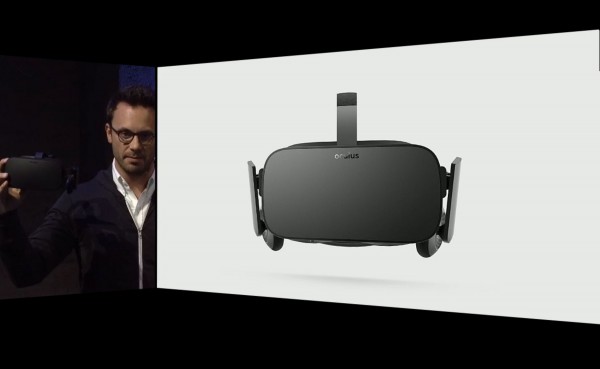
As you can see, the headset looks pretty similar to the leaks Reddit uncovered just a few days ago. There are headphones, although they will be detachable.
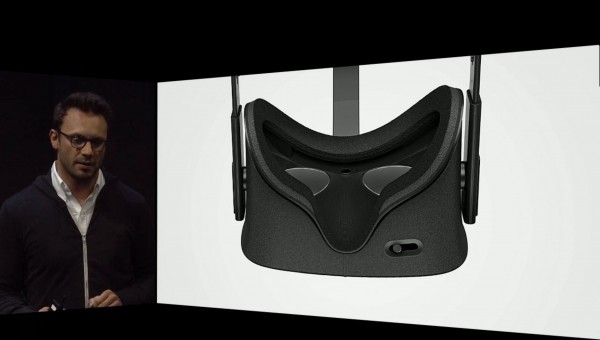
The lenses will be adjustable as everyone’s eyes are a little different. The headset has also been designed to be comfortable to wear even with glasses on as well, which will be a bonus for many.
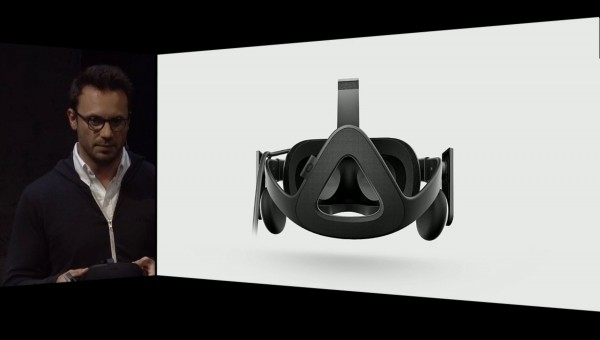
The headband goes over the top of your head and joins with the neckband around the back. Apparently the device is light weight and should be pretty comfortable to wear.
While everything looks pretty solid, Brendan Iribe did admit that the screen may not be as high resolution as they would like. However, that is likely down to the fact that today’s graphics hardware can’t push 90 frames per second at such high resolutions, so some compromises has to be made for the gameplay experience.
Aside from the headset itself, some more announcements were made. Microsoft has teamed up with Oculus to ensure that Rift titles get Direct X 12 support, the headset will also be natively supported in Windows 10 for an easy set up experience. Xbox One controllers will be included with the headset, which is good news at it really is a great gamepad. Jon has more on that, HERE.
This post shall be updated if pricing and pre-orders are announced during the event. Jon and I are watching live so we shall be keeping you all up to date pretty swiftly.
http://www.kitguru.net/channel/gener...r-oculus-rift/
-
12-06-15, 12:56 #70Tech Ubër-Dominus


- Registo
- Nov 2013
- Local
- City 17
- Posts
- 30,121
- Likes (Dados)
- 0
- Likes (Recebidos)
- 2
- Avaliação
- 1 (100%)
- Mentioned
- 0 Post(s)
- Tagged
- 0 Thread(s)
Lots of upcoming Oculus Rift games are in third person
Noticia:Although many of the early games and experiences on the Oculus Rift have been in the first person, a lot of the ones shown off during today’s pre-E3 Oculus press event have shown us a far different perspective. Third person gaming does work well in VR – we can speak with personal experience on that – and that’s exactly what a number of developers are doing with their first official VR games.

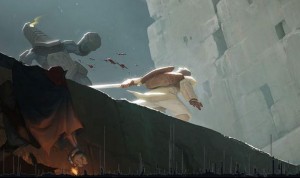
Gunfire games was first up, talking about its new, third person labyrinth exploration game. It’s called Chronos and features dungeon crawling throughout the protagonist’s entire life. As the player fails and restarts, the character must wait a year before diving into the bowls of the dungeon again, which means he’ll age. As he gets older, his stats and abilities will change, giving us that evolving gameplay experience that Molyneux once promised us with the first Fable.
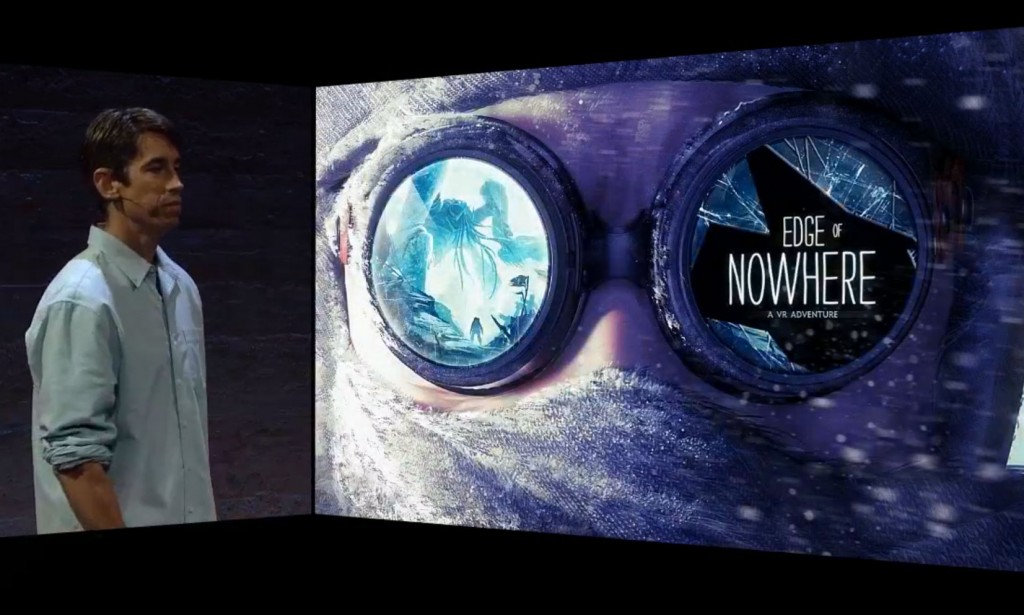
Spyro and Sunset Overdrive developer Insomniac Games, has a game of its own, which will be exclusive to Oculus Rift – another snub to Sony – and will feature… stuff, in a frozen world. Again it’s third person, but the content of the game wasn’t really explained. It has a nice art style and looks to mix in some Cthulu like tentacles with exploration in the frozen wastes.


Along with these two big announcements, a few other experiences were shown off during a quick montage at the end of the game showcase, during which already shown off demos like Luckey’s quest made an appearance.
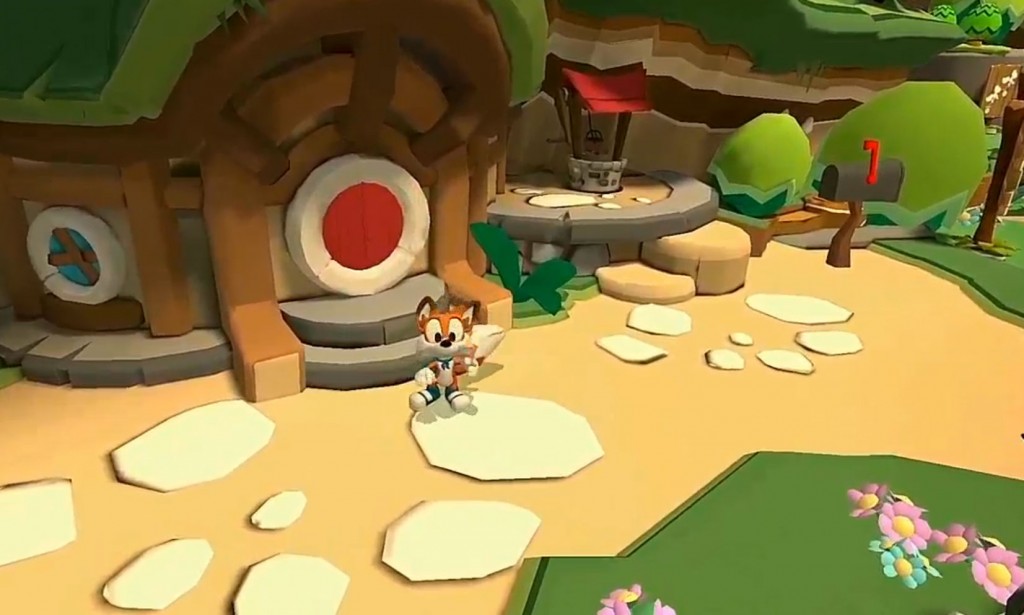
http://www.kitguru.net/gaming/jon-ma...-third-person/
-
12-06-15, 12:57 #71Tech Ubër-Dominus


- Registo
- Nov 2013
- Local
- City 17
- Posts
- 30,121
- Likes (Dados)
- 0
- Likes (Recebidos)
- 2
- Avaliação
- 1 (100%)
- Mentioned
- 0 Post(s)
- Tagged
- 0 Thread(s)
Oculus announces ‘Oculus Touch’ controllers for the Rift
Noticia:At the Oculus VR event this evening, Palmer Luckey pulled a Steve Jobs with a ‘one more thing…’ moment, wrapping up the show with the announcement of Oculus Touch, the dedicated virtual reality controller that will allow you to interact with objects in the virtual world.
Update: Palmer Luckey has tweeted that the Oculus Touch will be sold separately from the Rift and will have its own pre-order system, which will launch at the same time as the CV1.
Palmer Luckey @PalmerLuckey
Oculus Touch will be shipping H1 2016 - Preorders will open alongside the Rift.
The project was codenamed ‘Half Moon’ throughout development. The controllers are designed to bring an authentic hand using experience in to virtual reality. Right now when you use a VR headset, it gets tempting to reach out in to the world around you, except you can’t interact with any of it, which is the exact problem Oculus Touch aims to fix.
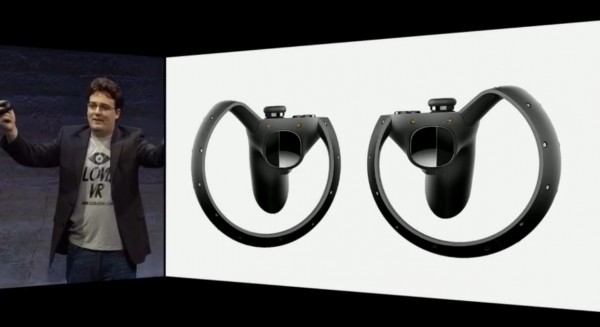
There are two controllers, one for each hand, they are also wireless so you won’t have any cables getting in the way. Motion tracking is included, using the same tracking technology found in the Rift headset. Both hand controllers have a thumb stick, two buttons and a trigger, which will allow you to pick up items in the world. Palmer used a virtual gun as an example, which you could then fire .
The Xbox One controller will be included with every Rift headset as it gives developers a base to work with as they know every single Rift owner will have one. This likely means that the Oculus Touch will be sold separately and not necessarily supported in every single game.
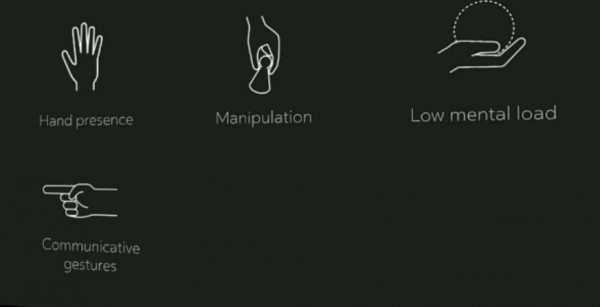
The controllers both feature haptic feedback to allow you to feel that you are touching something when you interact with items in the virtual world. The controllers also come equipped with sensors to recognize hand gestures, such as waving.
Unfortunately, pricing was not announced, nor were pre-order dates for the Oculus Rift. However, we do know that people will be getting their first hands on experiences with these devices next week at E3 so I imagine we’ll be hearing some impressions fairly soon.
http://www.kitguru.net/channel/gener...-for-the-rift/
-
12-06-15, 12:58 #72Tech Ubër-Dominus


- Registo
- Nov 2013
- Local
- City 17
- Posts
- 30,121
- Likes (Dados)
- 0
- Likes (Recebidos)
- 2
- Avaliação
- 1 (100%)
- Mentioned
- 0 Post(s)
- Tagged
- 0 Thread(s)
All Oculus Rift games will have VR demos
Noticia:The pre-E3 Oculus VR press event was huge, with news about everything from the hardware to the games we’ll be playing. However one of the most monumental changes to the gaming landscape could come in the way that the experiences and games are delivered. As well as having their own digital distribution and purchasing platform, every Oculus Rift game will have a VR demo for people to experience before buying.
The lack of demos in the modern gaming space has been attributed to the fact that often, hyping a title is much more lucrative than showing a game, which is an unfortunate system that breeds little but contempt for publishers. Steam has also received a lot of flak over the years for its lack of enforcing demos, though its recent refund system may go some way to aiding that, even if it is imperfect.
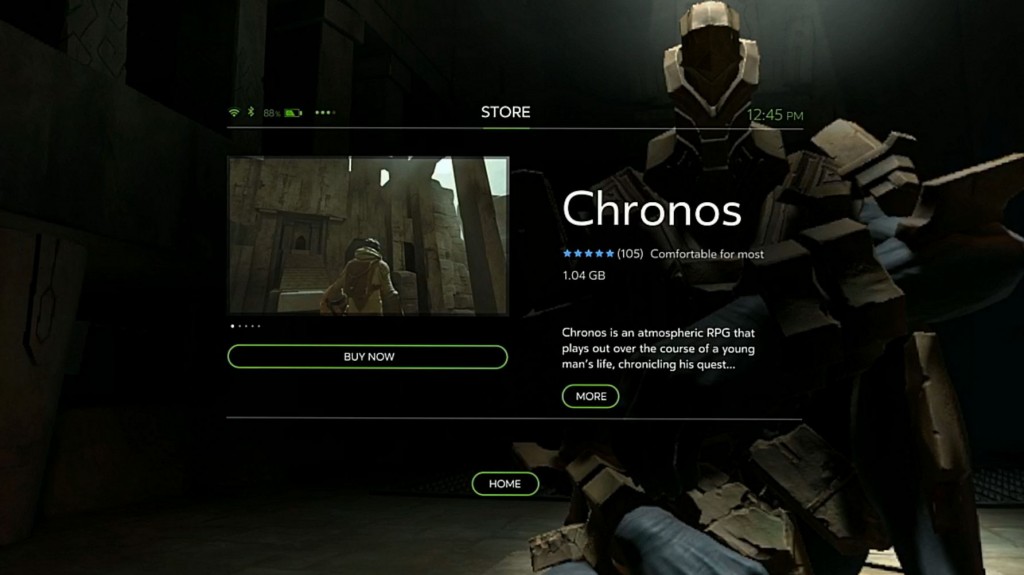
Each game will also have an rating for how comfortable the VR experience is
Perhaps it may be forced to change its tune though, as Oculus Home was announced with the fact that every user will be able to not only navigate through the menus in VR, but will be able to buy, download and trial games within the same system. Like the look of some 3D screenshots? Try out the first few seconds of the game, or just look around its starting area in true virtual reality.
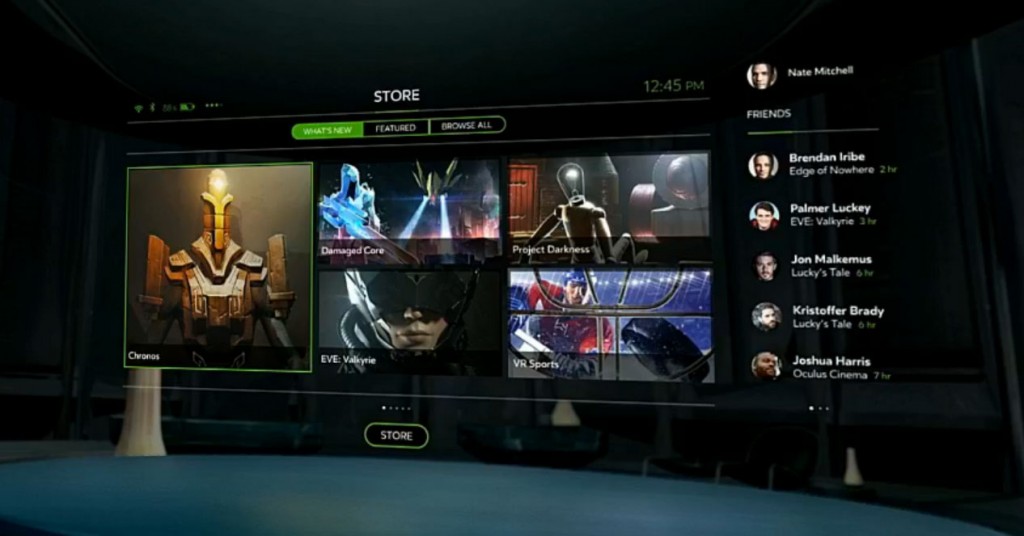
The VR store looks like an easily navigable environment, but it’s the demos which are the most exciting aspect for this writer
This could not only mean Steam has another worthy competitor (if you factor in GoG Galaxy) but it could also lead to a fundamental shift in the way games are marketed. If everything sold through Oculus Home has to include a demo, developers will be much more interested in producing exciting opening sequences for their games, rather than just making epic looking trailers.
http://www.kitguru.net/gaming/jon-ma...have-vr-demos/
-
12-06-15, 19:06 #73Tech Ubër-Dominus


- Registo
- Nov 2013
- Local
- City 17
- Posts
- 30,121
- Likes (Dados)
- 0
- Likes (Recebidos)
- 2
- Avaliação
- 1 (100%)
- Mentioned
- 0 Post(s)
- Tagged
- 0 Thread(s)
Oculus offers up $10 million to help independent game developers
Noticia:Last night was filled with Oculus news, we finally got our first look at the consumer version of the headset, we were introduced to the Oculus Touch controllers, we saw a couple of games but there is one thing Oculus announced that isn’t getting a huge amount of intention, the company offered up $10 million in order to help independent game studios.
On stage at the Oculus VR event last night, the company’s own Anna Sweet announced that Oculus would be putting up a fund to help indie devs create their games for the Rift.
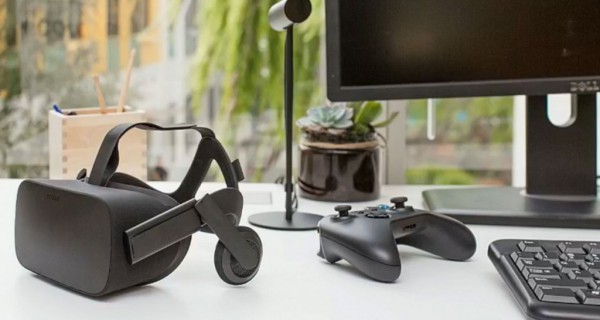
Unfortunately, there was only so much time for the event and it was already packed with announcements so aside from the initial promise of funding, nothing else is really known.
Oculus has yet to reveal how independent developers can apply for a chunk of the cash for their project or what terms and conditions would apply to such a deal. It is possible that Oculus would want exclusivity over the game for its platform, right now there are quite a few unanswered questions.
http://www.kitguru.net/channel/gener...me-developers/
-
13-06-15, 09:27 #74Tech Ubër-Dominus


- Registo
- Nov 2013
- Local
- City 17
- Posts
- 30,121
- Likes (Dados)
- 0
- Likes (Recebidos)
- 2
- Avaliação
- 1 (100%)
- Mentioned
- 0 Post(s)
- Tagged
- 0 Thread(s)
The Great Oculus Rift Hype Machine, Continued
Noticia:When the Oculus Rift finally ships, after nearly three years of manipulated anticipation and "hurry up and take my money" buyer frustration, it is going to blow your ever-loving mind. The additional industrial design touches Oculus' put on the final headset hardware, the use of XBox One controllers, and the where-did-this-come-from Oculus Touch (the company's new sneaky-obvious wristwear controllers), will all only add to the allure.
Oculus has never shied away from explaining that it has taken this long because the company wanted to get it right -- apparently down to the fabric on the headset.

I have watched the Oculus crescendo, practically from the beginning, experiencing the many demonstrations along the way, and I'm not going to hide it: I am in the tank for VR and for any company that will accelerate the adoption of VR, and for now one of those companies is undoubtedly Oculus.
My disclosures: None. My benefits are the same as yours, as a fan of technology advancement, as someone anxious to be surprised by the next big thing, as someone skeptical about almost anything pretending to be that. But I am not at all skeptical about this.
(Wait. Scratch that. I got a coffee mug and a t-shirt at the grand unveiling on Thursday.)

I have pushed Tom's Hardware editors and myself to -- is there a more apt word for it? -- immerse ourselves in this technology because I believe it is, literally, a game changer in every sense. It will change the way games are conceived and played, the way we are entertained (and sure, read further into that as well, if it suits you), and the way interactive experiences and other human-oriented applications evolve.
I have tried every demo at every opportunity, as have many of our team. One of our editors bought DK2. We have Gear VR. We have tried Microsoft Hololens, HTC/Valve Vive. We will try them again. These things don't get old.
In short, I cannot wait. But that's just the problem. In less than nine months, the Oculus Rift will ship. That's still almost a year away, which is ages in tech time.
Beyond that, the hardware requirements to fuel the Oculus Rift are beyond the reach of too many. The typical consumer doesn't build PCs. Surely not even the majority of the Tom's Hardware crowd are packing the equivalent of an Intel Core i5 and an Nvidia GeForce GTX 970 and 8 GB of RAM.
Would you upgrade for high quality VR? Some undoubtedly will, others will wait, and still others probably should wait until there's more content. Despite all of the demonstrations we've seen, it is still hard to believe that enough content will be ready. Anna Sweet, head of development strategy for Oculus, announced on Thursday that Oculus is giving away $10 million to spur game development. On the one hand, that's a rounding error for Facebook, and on the other, it's also a cry for help -- Oculus needs content, and it needs it yesterday.

Games like CCP Games' EVE:Valkyrie, Playful's Lucky's Tale, and many others are fun, but the demonstrations have been mostly of prototype games, snippets meant to excite interest. I'm told there will be more at E3, including a much-enhanced Lucky's Tale, now one year past my first experience with it. Will people even play VR games for an hour or more? Will the big studios jump in, or leave the early work to independent studios?

Oculus CEO Brendan Iribe proclaimed on Thursday: "For the first time, we will finally be inside of the game. It will change everything. We've been dreaming of it. It's finally here." (If by "here" you mean next year.) The more sobering fact is that when it ships, there will still be far too much work to do.
If Thursday's presentation and discussions revealed anything, it's that high quality VR takes time. It takes attention to detail. Without that attention to detail, the Oculus Rift and the experiences it delivers would not stand out.
The Details Matter
With each incremental dribble of news, there's a sense that Oculus is watching and learning and perfecting the first product it will ship. Did you catch, for example, that Oculus CEO Palmer Luckey said he had watched thousands of people using the early development kits? I've seen him, excited as a 12-year-old, hurrying a guest off to see a demo. I've seen him watch their reaction. (Don't tell him I was watching him watching them.)

(At the event yesterday, he practically ran me over to put the Touch controllers on a pedestal so all of us taking pictures could also see and capture them, too. I suggested he act as our head and hand model, and he gladly obliged, with gun gestures and various angles, talking about the nuances of the controllers like Willy Wonka describing the inner workings of his chocolate river.)

Over the past couple of years, as each person tried on the headset over time, jostling it on their misshapen heads, squeezing the headset like an accordion to make the lenses closer together, moving it gingerly around the frames of their designer glasses, mouths open like mesmerized toddlers at the circus, sometimes puking or feeling nauseated, the Oculus team had apparently been taking notes. The company has accounted for and fixed each of these problems.

The attention to detail on the final Rift headset almost seems to steal a page from the Apple playbook. Executives talked on Thursday about the unit's "strap architecture" and even called it a "facial interface." (Mm, OK.)
But once we're past the theater of it, it's also important to understand that unless a company thinks this way, that something like the strap of a headset is so important as to have an "architecture," then perhaps it's not taking the details seriously enough. If you play video games for an hour or more at a time, then comfort matters. If you've tried the various VR demos, you'll know that these details are important, whatever fancy nomenclature Oculus invents.

Oculus said that the Rift, now covered in some sort of fabric (what, no thread count details? No zigzag stitch architecture mumbo jumbo? No hand-rubbed seamless contours?), is lightweight (I tried to find out exactly how lightweight, but unfortunately I don't keep a portable scale on me), doesn't pull on your face, doesn't move around, it goes on like the old familiar ballcap, it fits around glasses with ease, it adjusts to each of our ocular idiosyncrasies, and the company believes it achieved its primary goal of making it so that you don't even know it's there, that it "just disappears."
Apple: It just works. Oculus: It just disappears. Apple: It feels good in the hand. Oculus: "It feels great when you put it on."
Get it?
Not a stone is being left unturned. The Rift has an unmatched field of view and visual resolution. AMD and Nvidia have created new rendering schemes and exposed GPU functions for VR developers. And so on. But Oculus recognizes that there's still more work to do. Iribe, talking about some of the visual achievements accomplished so far, also indicated that the resolution wasn't as high as it will be one day.
The new and final Sensor, which wirelessly syncs with the headset, is small and includes a constellation tracker for precise head tracking. Oculus didn't leave audio to chance either, promising that the latency needs to be nonexistent here, as well -- "Rift tricks your eyes, but it tricks your ears, too," Iribe said.
What of those images leaked from the Oculus website, the one that had a camera in the front of the headset? It was an old design concept. Oculus decided that the camera might overwhelm the processors with too much information right now.
The Xbox One controller came after what Oculus product VP Nate Mitchell described as years of work on the company's own controller. Those prototypes eventually became the Touch controller, Mitchell told me. Balance and ergonomics on a controller was difficult, Mitchell said, again pointing to the level of detail Oculus seems to put into everything it has created.
Iribe echoed those thoughts, pointing to how Sony "showed a consumer design earlier than anyone else, and yet they're really taking their time to get it right."
Iribe also said that both the Touch controllers and the final headset design came from the company's acquisition of the Carbon Design team last year -- that's the team, he said, that created the Xbox 360 controllers and various keyboards and mice for Microsoft. Iribe said that Oculus is a team of mostly hardware and software engineers, so the company saw fit to bring in the experts to get the industrial design right.
I tried to do a little social engineering on Oculus execs to ascertain how it worked. For instance, it's wireless -- what kind? Not saying. What does it connect to, the PC or the tracking system? Not saying. What sensors are being used? Not saying. How is latency being managed if it's wireless? Good question, more details will emerge on this, possibly even at E3. (And can it check my heart rate? My sobriety? Or remind me to check on the kids?)

Half Moon, the prototype name for the Touch, will be out in the first half of 2016, which is to say after Rift ships. It provides high precision, low latency, and six degrees of finger tracking. It uses inertial measurement to do all of that tracking, and the intent is to allow precise manipulation of virtual objects as you would in real life. But it also includes traditional inputs such as buttons, a trigger, and an analog stick, and there is haptic feedback, as well.
Mitchell did say that the controllers use the same kind of constellation tracking as the Sensor and pointed out the IR LEDs on the rings, and he indicated that more details about Touch would emerge in time. We'll have a chance to try it out at E3.
Amid even more wordplay about things like "hand presence," and "low mental load," there's yet another message in here. While Oculus tried to create a controller, they decided not to reinvent the same old thing, instead inventing something entirely new that made sense with the Rift -- something that they could control as part of the entire system and ensure that it kept to its low latency demands.

Remember that head tracking, audio synchronicity and hand tracking must be precise to feel real. Oculus' vision of VR is very much focused on the "R" part, and three years of engineering work is driven precisely by that. When Iribe talked about mobile, console and PC VR, he emphasized that PC VR, in the form of the Rift, is where you fully believe that you're "there," with a full sense of presence, because of the high fidelity the PC can muster.
In a land o' leaks, this was truly the first we had heard of Touch. In addition to the hardware, Luckey talked about the Toybox, a sandbox where Oculus has created robots to control, garden gnomes to punch, and tetherballs to smack. Again, these should be ready for us to try out at E3.
Content
Above all, content is the final hurdle. Jason Rubin, the head of Oculus Studios, invited a few guests on stage, including the CEOs of CCP Games, Gunfire Games, and Insomniac. Once again, the content looked compelling, if brief. Rubin talked about some of what we'd see at E3, and he finally showed a list of developers working with Oculus.

It's an impressive list, but save for Square Enix, there's not a major game developer among them, and Rubin wouldn't say what the game developer was creating for the Rift. If this truly is the opportunity to re-create gaming, where are the big boys? Rubin insisted that "big studios will come and will play inside VR and they're extremely excited about it." He hinted that there would be much more prior to the official Rift launch next year.
I pushed further, asking what hurdles those developers saw, and he talked about how the independent developers started early and had a passion about VR from the get go. The bigger studios require more thought and more reasons to jump into VR, he said, and they are "not driven by the same immediate desire to fulfill the dream...of making worlds in VR."
When asked about the nascent nature of VR and the lack of an installed base, he countered that most of the developers realize that the learning curve for VR is steep, as it has been for other transitions in game development, and that those who "don't jump in early aren't fast followers, they're the ones who never catch up." In other words, the bigger players get it, and they know they must experiment, "even if an installed base isn't there on a spreadsheet."
Rubin did say that most studios typically have three-year plans for games, but he said he's encouraging them not to think that way, that so much is changing that three years is too long. (Yes, three years is too long. I think I've heard that somewhere before.)
Rubin said that most of the demonstrations and games we've seen so far are 15 minutes or less, and that this is a good way to figure out whether you have enough to make a full game out of the experience. He called 2014 the year of the demos, said 2015 will be about making what sells, and asserted that 2016 will be about making longer VR games.
Some day. Some day.
Meanwhile, I have the mug and the t-shirt.
http://www.tomshardware.com/news/ocu...ine,29365.html
-
14-06-15, 14:49 #75Tech Ubër-Dominus


- Registo
- Nov 2013
- Local
- City 17
- Posts
- 30,121
- Likes (Dados)
- 0
- Likes (Recebidos)
- 2
- Avaliação
- 1 (100%)
- Mentioned
- 0 Post(s)
- Tagged
- 0 Thread(s)
The Great Oculus Rift Hype Machine, Continued
Noticia:When the Oculus Rift finally ships, after nearly three years of manipulated anticipation and "hurry up and take my money" buyer frustration, it is going to blow your ever-loving mind. The additional industrial design touches Oculus' put on the final headset hardware, the use of XBox One controllers, and the where-did-this-come-from Oculus Touch (the company's new sneaky-obvious wristwear controllers), will all only add to the allure.
Oculus has never shied away from explaining that it has taken this long because the company wanted to get it right -- apparently down to the fabric on the headset.

I have watched the Oculus crescendo, practically from the beginning, experiencing the many demonstrations along the way, and I'm not going to hide it: I am in the tank for VR and for any company that will accelerate the adoption of VR, and for now one of those companies is undoubtedly Oculus.
My disclosures: None. My benefits are the same as yours, as a fan of technology advancement, as someone anxious to be surprised by the next big thing, as someone skeptical about almost anything pretending to be that. But I am not at all skeptical about this.
(Wait. Scratch that. I got a coffee mug and a t-shirt at the grand unveiling on Thursday.)

I have pushed Tom's Hardware editors and myself to -- is there a more apt word for it? -- immerse ourselves in this technology because I believe it is, literally, a game changer in every sense. It will change the way games are conceived and played, the way we are entertained (and sure, read further into that as well, if it suits you), and the way interactive experiences and other human-oriented applications evolve.
I have tried every demo at every opportunity, as have many of our team. One of our editors bought DK2. We have Gear VR. We have tried Microsoft Hololens, HTC/Valve Vive. We will try them again. These things don't get old.
In short, I cannot wait. But that's just the problem. In less than nine months, the Oculus Rift will ship. That's still almost a year away, which is ages in tech time.
Beyond that, the hardware requirements to fuel the Oculus Rift are beyond the reach of too many. The typical consumer doesn't build PCs. Surely not even the majority of the Tom's Hardware crowd are packing the equivalent of an Intel Core i5 and an Nvidia GeForce GTX 970 and 8 GB of RAM.
Would you upgrade for high quality VR? Some undoubtedly will, others will wait, and still others probably should wait until there's more content. Despite all of the demonstrations we've seen, it is still hard to believe that enough content will be ready. Anna Sweet, head of development strategy for Oculus, announced on Thursday that Oculus is giving away $10 million to spur game development. On the one hand, that's a rounding error for Facebook, and on the other, it's also a cry for help -- Oculus needs content, and it needs it yesterday.

Games like CCP Games' EVE:Valkyrie, Playful's Lucky's Tale, and many others are fun, but the demonstrations have been mostly of prototype games, snippets meant to excite interest. I'm told there will be more at E3, including a much-enhanced Lucky's Tale, now one year past my first experience with it. Will people even play VR games for an hour or more? Will the big studios jump in, or leave the early work to independent studios?

Oculus CEO Brendan Iribe proclaimed on Thursday: "For the first time, we will finally be inside of the game. It will change everything. We've been dreaming of it. It's finally here." (If by "here" you mean next year.) The more sobering fact is that when it ships, there will still be far too much work to do.
If Thursday's presentation and discussions revealed anything, it's that high quality VR takes time. It takes attention to detail. Without that attention to detail, the Oculus Rift and the experiences it delivers would not stand out.
The Details Matter
With each incremental dribble of news, there's a sense that Oculus is watching and learning and perfecting the first product it will ship. Did you catch, for example, that Oculus CEO Palmer Luckey said he had watched thousands of people using the early development kits? I've seen him, excited as a 12-year-old, hurrying a guest off to see a demo. I've seen him watch their reaction. (Don't tell him I was watching him watching them.)

(At the event yesterday, he practically ran me over to put the Touch controllers on a pedestal so all of us taking pictures could also see and capture them, too. I suggested he act as our head and hand model, and he gladly obliged, with gun gestures and various angles, talking about the nuances of the controllers like Willy Wonka describing the inner workings of his chocolate river.)

Over the past couple of years, as each person tried on the headset over time, jostling it on their misshapen heads, squeezing the headset like an accordion to make the lenses closer together, moving it gingerly around the frames of their designer glasses, mouths open like mesmerized toddlers at the circus, sometimes puking or feeling nauseated, the Oculus team had apparently been taking notes. The company has accounted for and fixed each of these problems.

The attention to detail on the final Rift headset almost seems to steal a page from the Apple playbook. Executives talked on Thursday about the unit's "strap architecture" and even called it a "facial interface." (Mm, OK.)
But once we're past the theater of it, it's also important to understand that unless a company thinks this way, that something like the strap of a headset is so important as to have an "architecture," then perhaps it's not taking the details seriously enough. If you play video games for an hour or more at a time, then comfort matters. If you've tried the various VR demos, you'll know that these details are important, whatever fancy nomenclature Oculus invents.

Oculus said that the Rift, now covered in some sort of fabric (what, no thread count details? No zigzag stitch architecture mumbo jumbo? No hand-rubbed seamless contours?), is lightweight (I tried to find out exactly how lightweight, but unfortunately I don't keep a portable scale on me), doesn't pull on your face, doesn't move around, it goes on like the old familiar ballcap, it fits around glasses with ease, it adjusts to each of our ocular idiosyncrasies, and the company believes it achieved its primary goal of making it so that you don't even know it's there, that it "just disappears."
Apple: It just works. Oculus: It just disappears. Apple: It feels good in the hand. Oculus: "It feels great when you put it on."
Get it?
Not a stone is being left unturned. The Rift has an unmatched field of view and visual resolution. AMD and Nvidia have created new rendering schemes and exposed GPU functions for VR developers. And so on. But Oculus recognizes that there's still more work to do. Iribe, talking about some of the visual achievements accomplished so far, also indicated that the resolution wasn't as high as it will be one day.
The new and final Sensor, which wirelessly syncs with the headset, is small and includes a constellation tracker for precise head tracking. Oculus didn't leave audio to chance either, promising that the latency needs to be nonexistent here, as well -- "Rift tricks your eyes, but it tricks your ears, too," Iribe said.
What of those images leaked from the Oculus website, the one that had a camera in the front of the headset? It was an old design concept. Oculus decided that the camera might overwhelm the processors with too much information right now.
The Xbox One controller came after what Oculus product VP Nate Mitchell described as years of work on the company's own controller. Those prototypes eventually became the Touch controller, Mitchell told me. Balance and ergonomics on a controller was difficult, Mitchell said, again pointing to the level of detail Oculus seems to put into everything it has created.
Iribe echoed those thoughts, pointing to how Sony "showed a consumer design earlier than anyone else, and yet they're really taking their time to get it right."
Iribe also said that both the Touch controllers and the final headset design came from the company's acquisition of the Carbon Design team last year -- that's the team, he said, that created the Xbox 360 controllers and various keyboards and mice for Microsoft. Iribe said that Oculus is a team of mostly hardware and software engineers, so the company saw fit to bring in the experts to get the industrial design right.
I tried to do a little social engineering on Oculus execs to ascertain how it worked. For instance, it's wireless -- what kind? Not saying. What does it connect to, the PC or the tracking system? Not saying. What sensors are being used? Not saying. How is latency being managed if it's wireless? Good question, more details will emerge on this, possibly even at E3. (And can it check my heart rate? My sobriety? Or remind me to check on the kids?)

Half Moon, the prototype name for the Touch, will be out in the first half of 2016, which is to say after Rift ships. It provides high precision, low latency, and six degrees of finger tracking. It uses inertial measurement to do all of that tracking, and the intent is to allow precise manipulation of virtual objects as you would in real life. But it also includes traditional inputs such as buttons, a trigger, and an analog stick, and there is haptic feedback, as well.
Mitchell did say that the controllers use the same kind of constellation tracking as the Sensor and pointed out the IR LEDs on the rings, and he indicated that more details about Touch would emerge in time. We'll have a chance to try it out at E3.
Amid even more wordplay about things like "hand presence," and "low mental load," there's yet another message in here. While Oculus tried to create a controller, they decided not to reinvent the same old thing, instead inventing something entirely new that made sense with the Rift -- something that they could control as part of the entire system and ensure that it kept to its low latency demands.

Remember that head tracking, audio synchronicity and hand tracking must be precise to feel real. Oculus' vision of VR is very much focused on the "R" part, and three years of engineering work is driven precisely by that. When Iribe talked about mobile, console and PC VR, he emphasized that PC VR, in the form of the Rift, is where you fully believe that you're "there," with a full sense of presence, because of the high fidelity the PC can muster.
In a land o' leaks, this was truly the first we had heard of Touch. In addition to the hardware, Luckey talked about the Toybox, a sandbox where Oculus has created robots to control, garden gnomes to punch, and tetherballs to smack. Again, these should be ready for us to try out at E3.
Content
Above all, content is the final hurdle. Jason Rubin, the head of Oculus Studios, invited a few guests on stage, including the CEOs of CCP Games, Gunfire Games, and Insomniac. Once again, the content looked compelling, if brief. Rubin talked about some of what we'd see at E3, and he finally showed a list of developers working with Oculus.

It's an impressive list, but save for Square Enix, there's not a major game developer among them, and Rubin wouldn't say what the game developer was creating for the Rift. If this truly is the opportunity to re-create gaming, where are the big boys? Rubin insisted that "big studios will come and will play inside VR and they're extremely excited about it." He hinted that there would be much more prior to the official Rift launch next year.
I pushed further, asking what hurdles those developers saw, and he talked about how the independent developers started early and had a passion about VR from the get go. The bigger studios require more thought and more reasons to jump into VR, he said, and they are "not driven by the same immediate desire to fulfill the dream...of making worlds in VR."
When asked about the nascent nature of VR and the lack of an installed base, he countered that most of the developers realize that the learning curve for VR is steep, as it has been for other transitions in game development, and that those who "don't jump in early aren't fast followers, they're the ones who never catch up." In other words, the bigger players get it, and they know they must experiment, "even if an installed base isn't there on a spreadsheet."
Rubin did say that most studios typically have three-year plans for games, but he said he's encouraging them not to think that way, that so much is changing that three years is too long. (Yes, three years is too long. I think I've heard that somewhere before.)
Rubin said that most of the demonstrations and games we've seen so far are 15 minutes or less, and that this is a good way to figure out whether you have enough to make a full game out of the experience. He called 2014 the year of the demos, said 2015 will be about making what sells, and asserted that 2016 will be about making longer VR games.
Some day. Some day.
http://www.tomshardware.com/news/ocu...ine,29365.html
Informação da Thread
Users Browsing this Thread
Estão neste momento 1 users a ver esta thread. (0 membros e 1 visitantes)







 Responder com Citação
Responder com Citação









Bookmarks